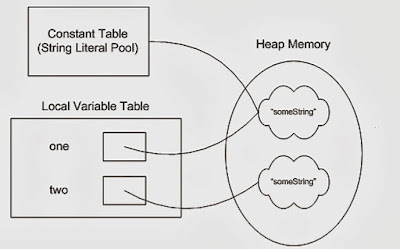The string is Immutable in Java because String objects are cached in String pool. Since cached String literals are shared between multiple clients there is always a risk, where one client's action would affect all another client. For example, if one client changes the value of String "Test" to "TEST", all other clients will also see that value as explained in the first example. Since caching of String objects was important from performance reason this risk was avoided by making String class Immutable. At the same time, String was made final so that no one can compromise invariant of String class e.g. Immutability, Caching, hashcode calculation etc by extending and overriding behaviors. Another reason of why String class is immutable could die due to HashMap.
Important and popularity of String as data type, transfer object and mediator has also made it popular in Java interviews. Why String is immutable in Java is one of the most frequently asked String Interview questions in Java, which starts with discussion of, what is String, how String in Java is different than String in C and C++, and then shifted towards what is immutable object in Java , what are the benefits of immutable object, why do you use them and which scenarios should you use them. This question sometimes also asked, "Why String is final in Java".
On a similar note, if you are preparing for Java interviews, I would suggest you take a loot at the Java Programming interview exposed book, an excellent resource for senior and mid-level Java programmer. It contains questions from all important Java topic including multi-threading, collection, GC, JVM internals and framework like Spring and Hibernate, as shown below:
Why String is Final in Java
As I said, there could be many possible answers to this question, and the only designer of String class can answer it with confidence. I was expecting some clue in Joshua Bloch's Effective Java book, but he also didn't mention it. I think following two reasons make a lot of sense on why String class is made Immutable or final in Java:String A = "Test"
String B = "Test"
Now String B called, "Test".toUpperCase() which change the same object into "TEST", so A will also be "TEST" which is not desirable. Here is a nice diagram which shows how String literals are created in heap memory and String literal pool.
2) String has been widely used as parameter for many Java classes e.g. for opening network connection, you can pass hostname and port number as string, you can pass database URL as a string for opening database connection, you can open any file in Java by passing the name of the file as argument to File I/O classes.
In case, if String is not immutable, this would lead serious security threat, I mean someone can access to any file for which he has authorization, and then can change the file name either deliberately or accidentally and gain access to that file. Because of immutability, you don't need to worry about that kind of threats. This reason also gels with, Why String is final in Java, by making java.lang.String final, Java designer ensured that no one overrides any behavior of String class.
不可变对象是线程安全的
3)Since String is immutable it can safely share between many threads which is very important for multithreaded programming and to avoid any synchronization issues in Java, Immutability also makes String instance thread-safe in Java, means you don't need to synchronize String operation externally. Another important point to note about String is the memory leak caused by SubString, which is not a thread related issues but something to be aware of.
String对象的不可变性使得可以缓存这个实例的哈希码
4) Another reason of Why String is immutable in Java is to allow String to cache its hashcode, being immutable String in Java caches its hashcode, and do not calculate every time we call hashcode method of String, which makes it very fast as hashmap key to be used in hashmap in Java. This one is also suggested by Jaroslav Sedlacek in comments below. In short because String is immutable, no one can change its contents once created which guarantees hashCode of String to be same on multiple invocations.
字节码加载的安全性
5) Another good reason of Why String is immutable in Java suggested by Dan Bergh Johnsson on comments is: The absolutely most important reason that String is immutable is that it is used by the class loading mechanism, and thus have profound and fundamental security aspects. Had String been mutable, a request to load "java.io.Writer" could have been changed to load "mil.vogoon.DiskErasingWriter"
Security and String pool being primary reason of making String immutable, I believe there could be some more very convincing reasons as well, Please post those reasons as comments and I will include those on this post. By the way, above reason holds good to answer, another Java interview questions "Why String is final in Java". Also to be immutable you have to be final so that your subclass doesn't break immutability. what do you guys think?
